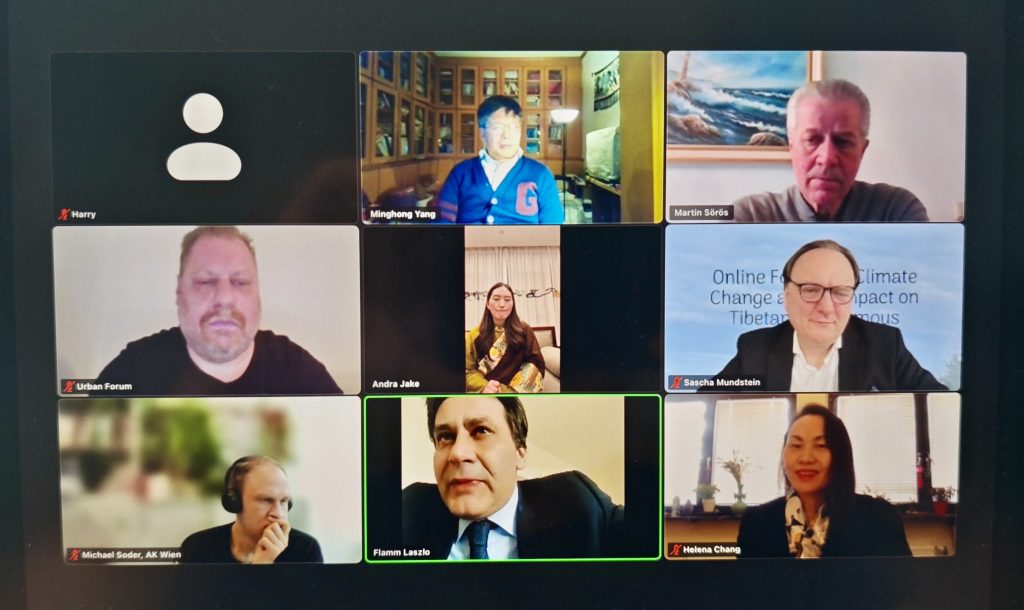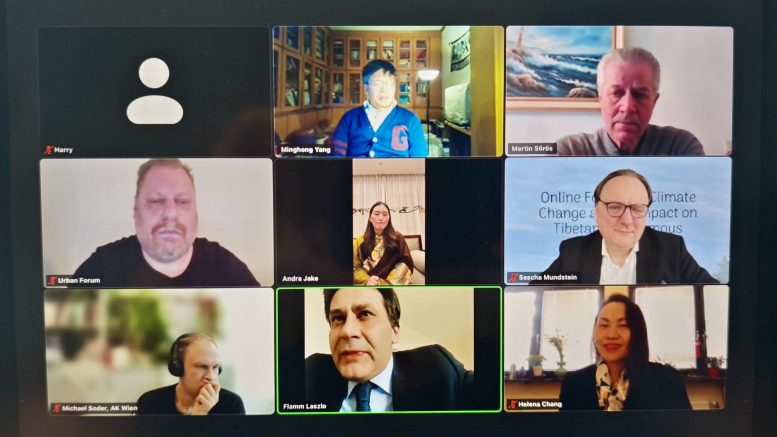
While global warming is causing fatal disasters in Europe, America, Asia and other continents, the climate issue needs urgent acknowledgement, responsible discussion, and quick action-taking. Yet, there is enough discrepancy in opinions around the world, be it political, economic, ecologic, or social. People from different cultural backgrounds would naturally react to changes in different ways. The global problem of the climate crisis, however, cannot be solved without the global consensus holding onto the agreed principles.
Complication wins the stage when geopolitics comes into play, unfortunately. For instance, when Tibet becomes a key word in discussion, the focus is often automatically undergoing a tonal shift. Concerning the climate change, Tibetan plateau is not to be ignored, either. Likewise, the wildlife there is threatened due to disappearing Himalayan glaciers. And the prevailing temperature trends are affecting human life. Due to the geographical formation and the social environment, the Tibetan Autonomous Prefectures located in several Chinese provinces are facing huge challenges, too. Garze, a Tibetan Autonomous Prefecture in Sichuan Province where ethnic Tibetans live, falls into place here. A recent online forum organized by URBAN FORUM and SINOPRESS, both located in Austria, concentrated on the region. The discussion offered a deeper look into the related issues, including the daily life under the climate change and the corresponding regional educational policies.
During the forum, the panelist Michael Soder, M.Sc.Ph.D. from the Institute for Social Change and Sustainability of Vienna University of Economics and Business, pointed out that climate change impacts human environments and social life in two ways. Firstly, environmental changes affect societies differently due to inequalities in education, income distribution, and the ability to adapt, be it at regional, national, or global levels. Secondly, if one takes climate change seriously and proactively addresses it by changing the energy foundation of production and consumption, the fundamental transformation will also affect society. The key difference, therefore, lies in the choice of either the uncontrolled climate change which will bring disaster, or the proactive action which aims at controlling its trajectory to avoid catastrophe.
In the context of climate change and the corresponding proactive action, the panelist Prof. Yang Minghong from Sichuan University disclosed in detail the significant environmental impacts on agriculture and animal husbandry on the Tibetan Plateau like rising temperatures, altered precipitation patterns, increase of the extreme weather events and more. To actively address these challenges, effective measures are required, and the field of education is a focused point. According to Prof. Yang’s research, Tibet had no modern schools before 1959, with education solely managed by monasteries. But now, modern school system with a 15-year-long free education covers all levels, with a pre-university enrollment rate exceeding 92% and university enrollment reaching 58%. Over 100 vocational schools that train workers in modern agricultural methods and green technologies have been set up. Many students enrolled there come from agricultural and pastoral families.
Mentioning the Tibetan Plateau, the vast in territory yet sparsely populated area is known for its cold, hypoxic high altitudes and the inconvenient transportation. In pastoral areas, the average altitude is 4,000 meters, with some reaching 4,500 meters. The unique instable climate situation calls for more practicality in establishing the regional schools. Boarding school system becomes thus a necessary choice. Prof.Yang expressed his dismay at knowing that some media claims the boarding schools are forbidding children to learn the Tibetan language. As a matter of fact, learning, using, and promotion of the Tibetan language as well as its script are guaranteed in the schools, just like for the standard Mandarin language. Besides the bilingual education, the students learn English, modern sciences, mathematics, physics, chemistry, biology, geography and more, as confirmed by Ms Pema, panelist from Garze in Sichuan Province who teaches English in her comprehensive public institution offering kindergarten through high school education.
Education is crucial for change and reform, as was unanimously agreed upon during the forum discussion. Mr. Soder stressed that beyond focusing on youth education, adult education is equally essential to adapt to a transforming world. The declining costs of technologies like solar, wind, and batteries have already improved the environment and boosted economies. Investment in education for the sake of implementing these technologies remains highly beneficial, especiall when the world is facing Trump’s US government threatening to drop out of the 2016 Paris Agreement/ 2024 Baku Agreement.
Dr. Laszlo Flamm, a foreign policy expert from Budapest, asserted on the forum the importance of the global cooperation as being essential for peace, security, and the climate crisis. The Nobel Peace Prize in 2024 highlighted the interconnectedness of these issues, he said. Global policymakers must collaborate rather than confront. Strengthening partnerships within the UN framework offers opportunities in areas like peace, security, climate change, education, and sustainable development. Projects like the UN’s 2030 Agenda for Sustainable Development, the New Agenda for Peace, and UNESCO’s Global Citizenship Education exemplify collaborative success.
The world needs more solidarity and mutual understanding.
With the U.S. threatening to withdraw from the Climate Agreement and to reduce the UN funding, China and the EU must shoulder greater responsibility, uttered Dr. Flamm. Building trust and establishing a strong cooperation framework are vital. In this sense, the UN provides an excellent platform for fostering partnerships and achieving global goals.
(First published at UNCAV Platform: uncav-vienna.org)


Be the first to comment on "Climate Change, Its Impact on Tibetan Plateau and the Corresponding Educational System"